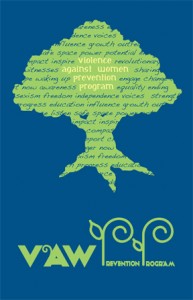Grounded in a social justice and feminist perspective, the Violence Against Women Prevention Program (VAWPP) is dedicated to addressing and preventing all forms of sexual violence through education, outreach, and advocacy.
History of VAWPP
In September 1979, a woman was brutally assaulted one afternoon while jogging on the University of Connecticut Storrs campus. The evening of the attack, a group of women involved with the Women’s Semester class of the Women’ s Studies Program wanted to take some action. They met with the Diana Woolis, then Director of the Women’s Center, and Pat Miller, the instructor of the Women’s Semester course, to discuss what women could do in protest of the continued violence against women at UConn. A meeting, open to anyone concerned with violence against women, was held at which further action was contemplated. A Day of Metanoia, as mechanism provided by the University to hold a day of reflection and organized protest, was the result of that meeting.
This day was observed on Thursday, October 4, 1979, and was considered the first step in confronting the issue of violence in the community. Workshops were held in every dormitory, in many classrooms, and various other places within the University. In the evening, there was a Speak Out, held in the Student Union Ballroom. Members of the University and surrounding community were invited to let the University know how they felt about violence in there community. Over a thousand people attended the Speak Out and the candle-light procession through campus that followed. The following is a statement from the Women’s Center Report on the Day of Metanoia:
On Thursday, October 4, 1979, the University of Connecticut observed a Day of Metanoia as a first step in confronting the issue of violence in our community. Specific acts of personal attack, property destruction and racism that have aroused deep concern are rooted in apathy, prevailing attitudes of sexism and racism, and willingness to condone violence by others. Our objective for the day was to ask each member of the community to look at him or herself, to ask how he or she contributed to violence and, in turn, how individually as well as institutionally we could contribute to reducing and eliminating violence. We hope to promote light rather than heat, reflection rather than accusation.
Continued discussions about the different possibilities and strategies which could be implemented to inform the UConn community led to the formation of the Rape Education Program (REP) in September of 1980. The program training and strategic plan was developed by 3 undergraduate women, Charlotte Merrill, Nadine Garnett, and Elizabeth Patrie, along with Center Director Diana Woolis, with the initial objectives of:
- informing the campus of the problems of sexual assault and sexual harassment;
- defining and explaining both;
- letting know with whom they can talk and file complaints and;
- encouraging people to talk about these problems.
Why VAWPP Matters today
Rape is the most common violent crime on American college campuses today. One in four college women report surviving rape or attempted rape at some point in their college career (Fisher, Cullen & Turner, 2000; Tjaden & Thoennes, 2006). This rate has remained the same since the 1980s (Koss, Gidycz, & Wisniewki, 1987). Sexual violence creates an environment that can limit learning and undermine students’ ability to achieve their full potential. Victims/survivors of violence are more likely to suffer academically, to experience depression and post-traumatic stress disorder, to abuse alcohol and drugs and to contemplate suicide (World Health Organization, 2002). Research and best practices coming out of the field of public health and the Centers for Disease Control and Prevention (CDC) support the need for a comprehensive coordinated approach to sexual violence prevention. The workshops offered by the Violence Against Women Prevention Program are part of UConn’s comprehensive approach.
Title IX on Campus
Title IX of the Education Amendments of 1972 prohibits discrimination based on sex in any educational program or activity that receives financial support from the Federal government. Under Title IX, schools must be proactive in ensuring that their campuses are free of sex discrimination which includes all forms of gender-based violence (i.e. rape, sexual assault, intimate partner violence, stalking, sexual harassment. Colleges and universities across the country are facing enhanced scrutiny around Title IX compliance and are having to adjust to new legislative mandates (both federal and state) that require more robust response and prevention efforts. VAWPP workshops are informed by and aligned with these mandates. For information, support and resources available at UConn, please visit the Title IX website.
Workshops
VAWPP workshops are interactive discussions, facilitated by peers or professional staff, which explore the entire continuum of sexual violence, from media images to criminal behavior. We emphasize a primary prevention approach that engages all stakeholders in the campus community to examine their role in ending sexual violence by addressing its root causes in oppression. If you would like to become involved with VAWPP as a workshop facilitator, please go to VAWPP Involvement page.
Contact VAWPP
- Phone: 860-486-4738
- Fax: 860-486-1104
- Web: http://womenscenter.uconn.edu/vawpp/
- Email: vawpp@uconn.edu
